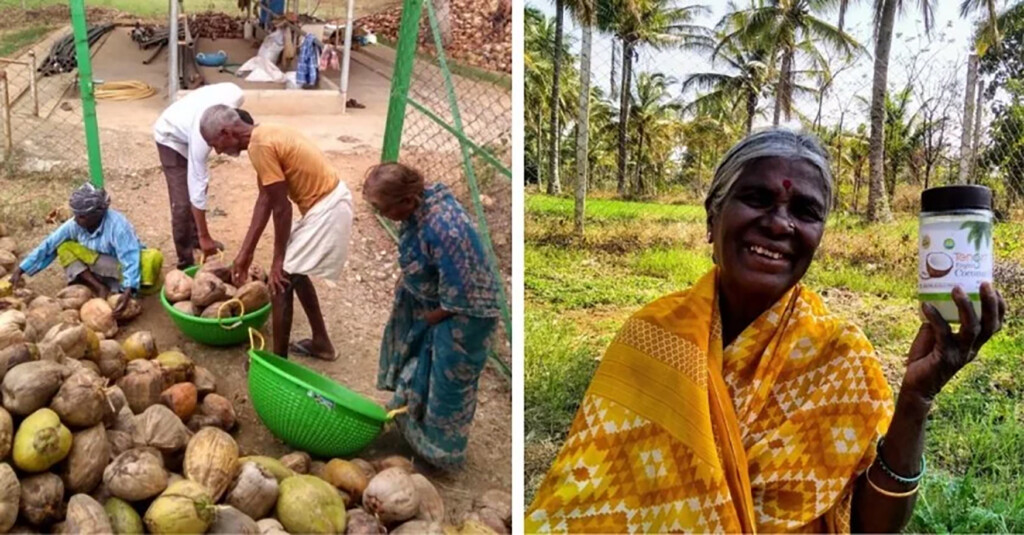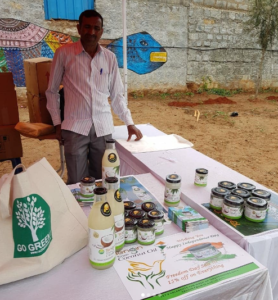Tengin is a shining example of how one entrepreneur’s determination and respect for tradition can bring prosperity to both people and the environment.
In the heartland of southern India’s agrarian landscape, where coconut trees sway in the breeze and generations have lived under their shade, a remarkable entrepreneur named Madhu Kargund emerged from humble beginnings to sow the seeds of change. Born into a farming family in the picturesque region of Arsikere, nestled within the Hassan district of Karnataka, Madhu’s journey is a testament to the enduring bond between a son and his roots.
Growing up under the verdant canopy of coconut trees, Madhu’s life was deeply intertwined with the rhythms of farming. He fondly recalls his childhood days, assisting his father in harvesting these bountiful fruits. Here, coconuts provide sustenance and a source of income for their village for generations.
Madhu couldn’t ignore the stark reality confronting many farmers in his community. The once-thriving agrarian livelihood had withered, leaving behind a landscape of uncertainty. Farmers were grappling with three fundamental challenges – a lack of stable income, dwindling demand for their produce, and a shortage of opportunities for skills development. It is here the story of Tengin took root.
Madhu Kargund envisioned a solution that would breathe new life into his village and the lives of its farmers. The idea was simple yet profound – introduce several coconut products and sell them under a brand name. This would ensure sustainable profits and empower the farming community. In 2017, Tengin was born, aptly named after the Kannada word for coconut.
Headquartered in bustling Bengaluru, Tengin is a coconut-centric brand on a mission to harness the potential of this versatile fruit. The company crafts an array of coconut-based products, from virgin coconut oil and chips fried in coconut oil to eco-friendly bowls crafted from coconut shells and nourishing soaps, among others.
The Tradition-Preservation Paradigm
What sets Tengin apart is its commitment to preserving tradition. In an age where technology often eclipses heritage, Madhu and his team chose to walk the path less taken. He employs time-tested methods to manufacture coconut products with the help of local villagers by sourcing coconuts locally.
One striking example of their dedication to tradition is the use of cold press technology for coconut oil extraction. Unlike modern methods that strip coconuts of their essential nutrients, this traditional approach retains the full nutritional value of the fruit. The oil is extracted in the village, packaged by the farmers themselves, and transported to Bengaluru for distribution.
Tengin boasts an impressive range of products, with prices ranging from Rs 100 to Rs 850. This diverse lineup ensures that consumers can enjoy a taste of southern India’s coconut-rich bounty while simultaneously supporting the very farmers who nurture these vital groves. The company has broken even and expects to become profitable soon.
Beyond Commerce

Tengin’s success story is not just about commerce; it’s about rejuvenating a way of life. Madhu Kargund’s vision is a beacon of hope for the farming community, offering them stability, dignity, and a chance to thrive on their ancestral lands once more. As the world seeks to embrace local and sustainable practices, Tengin stands as a shining example of how one entrepreneur’s determination and respect for tradition can bring prosperity to both people and the environment.
Tengin’s impact extends far beyond its coconut products. By engaging local farmers and villagers in the production process, the company fosters a sense of community and shared purpose. It is a model of sustainable entrepreneurship in which the benefits of economic growth are distributed equitably.
Tengin takes sustainability seriously. By using locally sourced coconuts and traditional manufacturing methods, the company minimizes its carbon footprint. Additionally, the traditional cold press technology ensures that the nutritional goodness of coconuts remains intact, making Tengin’s products not just delicious but also healthy. His story is a reminder that success need not be measured by profit alone but also by the positive impact one can have on the lives of others.











